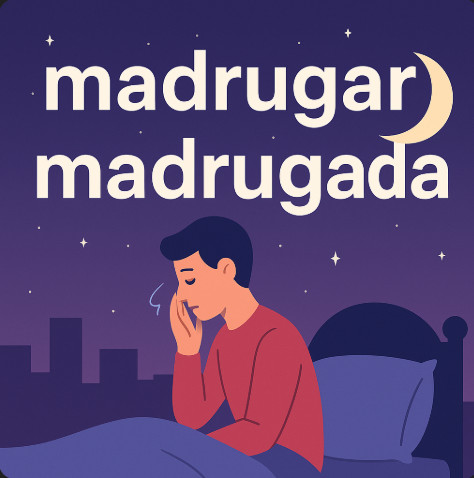In Spanish, madrugar means “to wake up very early in the morning.” At first, it sounds simple — just wake up early, right? But this word is more than a clock time. It carries a cultural feeling: starting your day before most people are even thinking about coffee.
The word comes from madrugada, which is the name for the very early hours of the day, the wee hours — usually hours after midnight and before sunrise. So when you madrugas, you’re waking up during the madrugada. In English we have “early morning,” but it’s not as precise. The Spanish madrugada has its own poetry: it can be calm, quiet, dark still, even mysterious.
You might hear:
“Nos vemos en la madrugada” — We’ll see each other in the very early morning.
“Me levanté en plena madrugada” — I got up in the middle of the early hours.
“La fiesta terminó en la madrugada” — The party ended in the early morning (but it was still dark).
So yes, madrugar means to get up early, but it’s tied to that special time called madrugada. If your flight is at 6 a.m., your friend will say “Mañana hay que madrugar.” If you have a test, your teacher might suggest “Madruga para repasar bien.” And of course, there’s the famous saying: “A quien madruga, Dios le ayuda.”
In Latin America, madrugar can be part of daily life. Markets open with the sunrise, workers head out before the heat arrives, and buses are already moving while in other countries people are still asleep. In Spain, the word also appears a lot — but you might hear it used with a groan, especially after a late night: “Mañana tengo que madrugar… qué horror.”
Examples you can use right away:
“Hoy madrugué para hacer ejercicio” — I got up early today to exercise.
“Mañana voy a madrugar para estudiar” — Tomorrow I’m going to get up early to study.
“No me gusta madrugar” — I don’t like getting up that early.
Learning madrugar and madrugada gives you more than vocabulary. You understand a rhythm of life. You see how language can capture not just what we do, but when we do it — and the feeling that comes with it.
So next time you wake up before the sun, you can smile and say: “Estoy madrugando… ya es de madrugada.”





